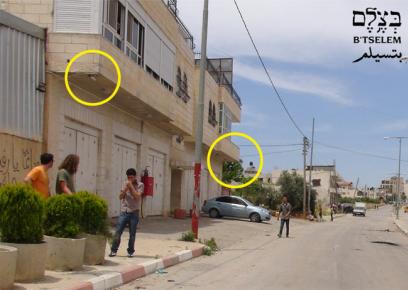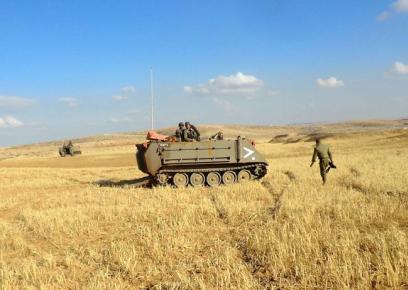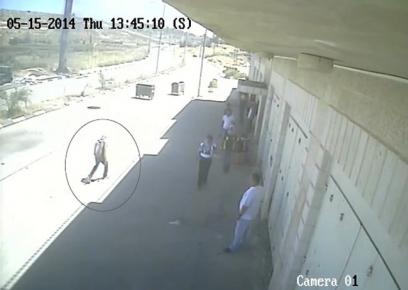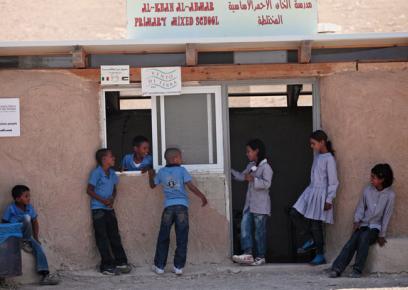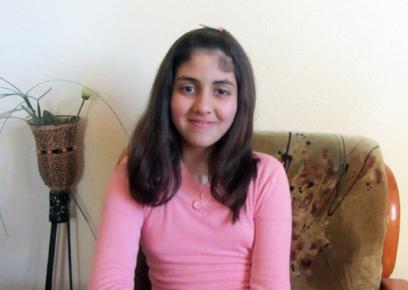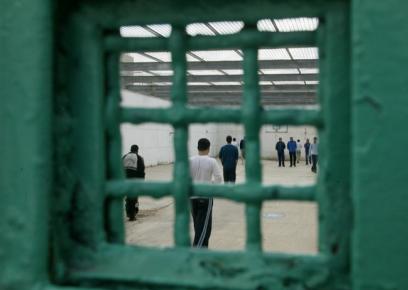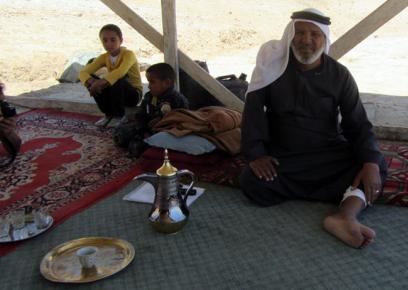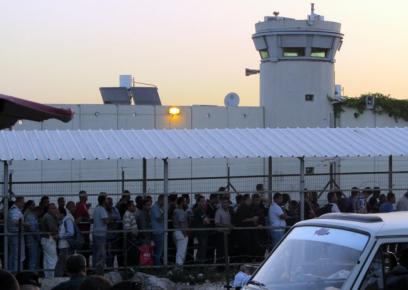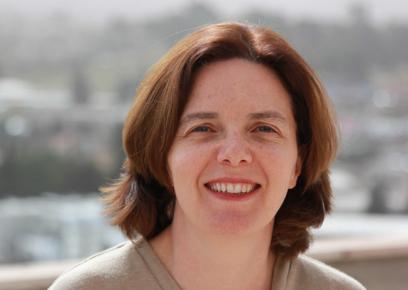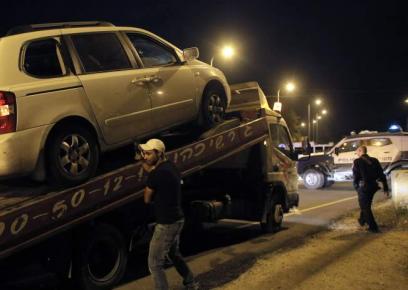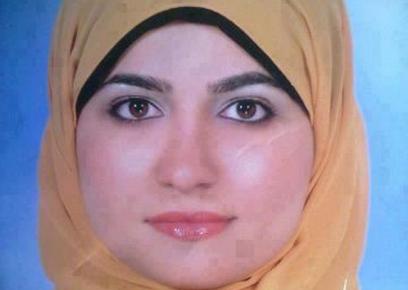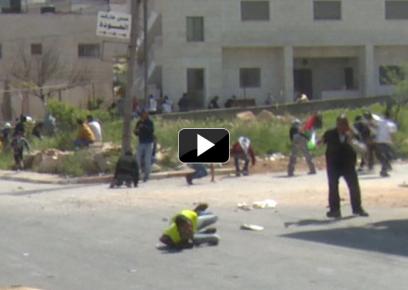On the Agenda
Filter updates:
The killing of the two teens in Bitunya: Uncut footage
For technical reasons only segments of the footage of the gunfire incident in Bitunya–in which Nadim Siyam Nawarah, 17, and Muhammad Mahmoud Salameh, 17, were killed and 2 others injured–were broadcast. B’Tselem is currently uploading all 11 hours of footage and welcomes all to view it to verify its authenticity. Since 2012 Israeli forces have killed 45 Palestinians in the West Bank. To date, only 1 soldier has been indicted. An investigative system leading to virtually no indictments for killing Palestinians conveys disregard for human life.
Despite HCJ ruling, military trains in Kh. Jenbah fields, South Hebron Hills
Kh. Jenbah is in Firing Zone 918 whose residents Israel wants to expel. After prolonged court proceedings, the villagers’ fate is currently being decided in mediation. Pending its outcome, an interim injunction prohibits expulsion of the villagers or harm to their property. In violation of the court order, the military last week trained in Jenbah’s fields, thereby damaging the crops. ACRI conveyed to the military GPS readings by B’Tselem as evidence of the training and it was discontinued. Photos by B’Tselem field researcher Nasser Nawaj'ah.
B'Tselem's initial findings on Nakba Day incident at Bitunya: grave suspicion that forces intentionally killed two Palestinian minors
On 15 May 2014, four Palestinians were shot with live bullets in their upper torsos in Bitunya. Two of them, both minors, died. B'Tselem's findings refute the army's claim that only crowd control measures were used and show that all four were shot with live ammunition, although they posed no danger to the forces. B'Tselem today received full security camera footage of the incident and will pass it on to the MPIU, demanding that the investigation examine not only the soldiers' conduct, but also the responsibility of senior commanders at the scene.
High Court rejects settlements’ petition to demolish Khan al-Ahmar school
On 13 May 2014 the HCJ rejected a petition by settlements in the Ma’ale Adumim area to implement demolition orders for a school and homes in Khan al-Ahmar, a Bedouin community. The rejection was grounded in the State’s announced plan to relocate the community to a site north of Jericho and its declared intention of preventing harm to minors. The relocation plan has yet to be shown to the residents, who object to the idea and demand a planning solution at their current location. International law prohibits forced transfer of protected civilians.
Israel continues to bar Gazan children from visiting fathers imprisoned in Israel
In July 2012, after a close to five year ban on all family visits to inmates from Gaza, Israel reinstated visits for adult relatives. As of 2013, children under 10 may also visit their imprisoned fathers. The arbitrary age limit means 260 Gazan children are unable to visit their fathers in Israeli prisons. The right to family life, including prison visits, is enshrined in both international and Israeli law. B’Tselem renews its call to allow prison visits to Gazan inmates by all first-degree relatives, and especially by their children.
Administrative detainees on hunger strike. Israel must stop illegal use of administrative detention
On 24 April 2014, Palestinian administrative detainees held in Israel announced a hunger strike to protest Israel’s of administrative detention. According to the Palestinian Prisoners’ Society, some 130 are now on strike. Israel is currently holding 191 Palestinians in administrative detention, i.e. without trial, in breach of international law, which allows such imprisonment only in exceptional cases as a last resort to prevent danger. The government must release all administrative detainees or prosecute them, in accordance with due process.
35 residents of Wadi al-Qatif, west of Jericho, face imminent expulsion
The Bedouins of Wadi al-Qatif, currently 68 persons, have lived in that location since 1982. In April 2014, following an application to the HCJ against demolition orders served for all homes there, the state advised of its plans to relocate the community to permanent sites. Yet 4 days later some residents were served 48-hour eviction orders. The HCJ then issued an interim injunction on the eviction. International law prohibits forced relocation. B’Tselem calls on the authorities to allow the community to remain in Wadi al-Qatif.
Int'l Workers' Day: No cause for celebration for Palestinians working in Israel
Palestinian workers do not have much to celebrate this Int’l Workers’ Day. As the occupying power in the West Bank, Israel has not promoted an independent Palestinian economy, forcing tens of thousands to rely on work in Israel and in settlements. Many are not granted work permits and must work illegally in harsh conditions. Israel must enable the development of the Palestinian economy and, until such time, must issue permits to Palestinians wishing to work in Israel – based on appropriate security checks – and uphold their rights as workers.
Op-Ed: Realizing change through monitoring, reporting, and fact-finding: B’Tselem’s work regarding Operation Cast Lead
In an article for the Professionals in Humanitarian Assistance and Protection, Jessica Montell highlights the importance of accurate information to any human rights advocacy. "Monitoring, reporting and fact-finding remain the backbone of B'Tselem's work – it is the necessary first step of any strategy to make change. Given the highly-charged context of our work, and the politicized efforts to discredit the work of groups like B'Tselem, our work would not be possible without the strong base of accurate, reliable information."
B’Tselem strongly condemns the shooting attack yesterday, in the southern West Bank
Media reports state that Palestinians firing live ammunition killed an Israeli civilian, and injured his wife. A nine year old boy riding in another car was injured. Civilians must be shielded from all hostilities and never targeted for attack. This obligation applies to all states, armed groups and individuals. Contrary to certain Palestinian claims, attacks against civilians within Israel’s borders are no different from attacks against settlers living in the West Bank. In both cases, the targets are civilians who must not be attacked and who must be protected from attacks.
Father of young woman killed by soldiers petitions High Court to oblige MAG to handle case promptly
Today, over 14 months since Lubna al-Hanash was killed on 23 Jan. 2013 by shots soldiers fired near al-‘Arrub RC, her father petitioned the HCJ with B’Tselem to oblige the MAG to decide whether to charge the perpetrators. Al-Hanash was shot in the head while strolling with a relative in the gardens of a college campus near Route 60. B’Tselem found that the two women posed no danger and that shooting at them was unjustified. The MAG’s prolonged delay violates the family’s rights by reducing the chances of an effective criminal procedure.
B’Tselem demands investigation of live gunfire wounding of camera volunteer at Bitunya, 4 April 2014
On 4 Apr. 2014 Muhammad Yassin, a B’Tselem’s camera volunteer, sustained severe internal injuries from live gunfire while filming clashes at Bitunya. Footage by David Reeb shows that Yassin was not at the center of the clashes, was carrying a camera and was clad in a vest indicating his photographer status. B’Tselem does not yet know what ammunition hit Yassin. The military, despite pledges to the contrary, often uses live 0.22-caliber bullets even when soldiers are not in mortal danger. B’Tselem demands that Yassin’s wounding be investigated.
Israel’s regime of apartheid and occupation is inextricably bound up in human rights violations. B’Tselem strives to end this regime, as that is the only way forward to a future in which human rights, democracy, liberty and equality are ensured to all people, both Palestinian and Israeli, living between the Jordan River and the Mediterranean Sea.
